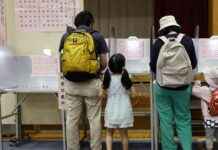A few weeks ago, the body of Oleksiï, 44, was found in a field, six months after his disappearance during the very first Russian assaults on the outskirts of kyiv.
However, this mother has not seen her son’s body since. To protect her psychologically, her granddaughter forbade her.
“She also didn’t want me to watch the video of her interrogation” by the Russians, she said before adding: “She told me that I wouldn’t have recognized him”.
– Massive strikes –
In recent days, the Russians have launched massive strikes on several Ukrainian cities, including the capital kyiv, in retaliation for the partial destruction of Russia’s Crimean Bridge, which Moscow blames on kyiv.
Russian attacks have also targeted Ukrainian energy infrastructure, raising fears of long power and water cuts as winter approaches.
Oleksii was among the fighters who repelled the invader for several weeks last March.
United Nations investigators claimed in late September that “war crimes” had been committed by the Russian army in the suburbs of kyiv during their occupation of the area in March. The examples of Boutcha and Irpine are still in everyone’s mind.
According to Tetyana, her son was probably interrogated by the Russians about his work before the war as an instructor at the academy of the SBU, the Ukrainian intelligence services.
At the time of his arrest, he had just joined a defense unit when his relatives lost track of him.
And despite the discovery of his body several days ago, his mother has no idea of the real cause of his death. Only a DNA test made it possible to identify him, his body being too degraded.
“It must have been so hard for him,” she whispers. Before adding: “He had never killed anyone in his life”.
– The war again in kyiv –
The conclusions of the UN’s international investigation had enabled some inhabitants of the region to close the dark chapter of the first weeks of the war.
Reconstruction work is indeed underway in the suburbs of kyiv and many families who left in the very first days of the fighting are now back.
But the change in strategy of Moscow’s troops in recent days, ready again to strike at all corners of Ukrainian territory, has brought the reality of war back to kyiv.
The city’s power grid still holds and cars swarm the streets at lunchtime. But some stores have again installed protections on their windows, to prevent shards of glass in the event of an explosion. Like a sense of déjà vu.
In the Boutcha cemetery, Andriï Tchernyak, the rector of the SBU academy in which Oleksiï worked assures: “We are very grateful to our international partners for their help”. “But everyone must understand that this is not a fight for Ukraine. It is a fight for democracy and peace,” he said.
– “I just hate them” –
Not far away, Tetyana says she only feels hatred and pain.
Before the war, his life was closely linked to those of his Russian friends, who live on the other side of the border. She herself speaks Russian on a daily basis.
But the decision of Russian President Vladimir Putin to invade his neighbor has swept away everything with a setback.
If the Kremlin thought to win the hearts of Ukrainians by sending its troops to them, it had the opposite effect on her.
“I have a lot of friends in Russia. But now I don’t know if I should consider them friends,” she said moments after her son’s funeral.
“They keep writing to me saying: We are not responsible for what is happening”. But I can’t get used to it. If they support this regime, then I just hate them.”








